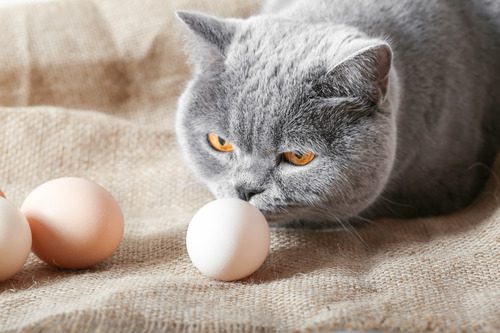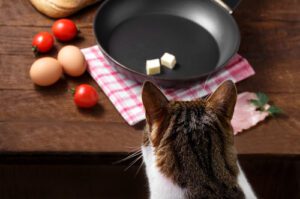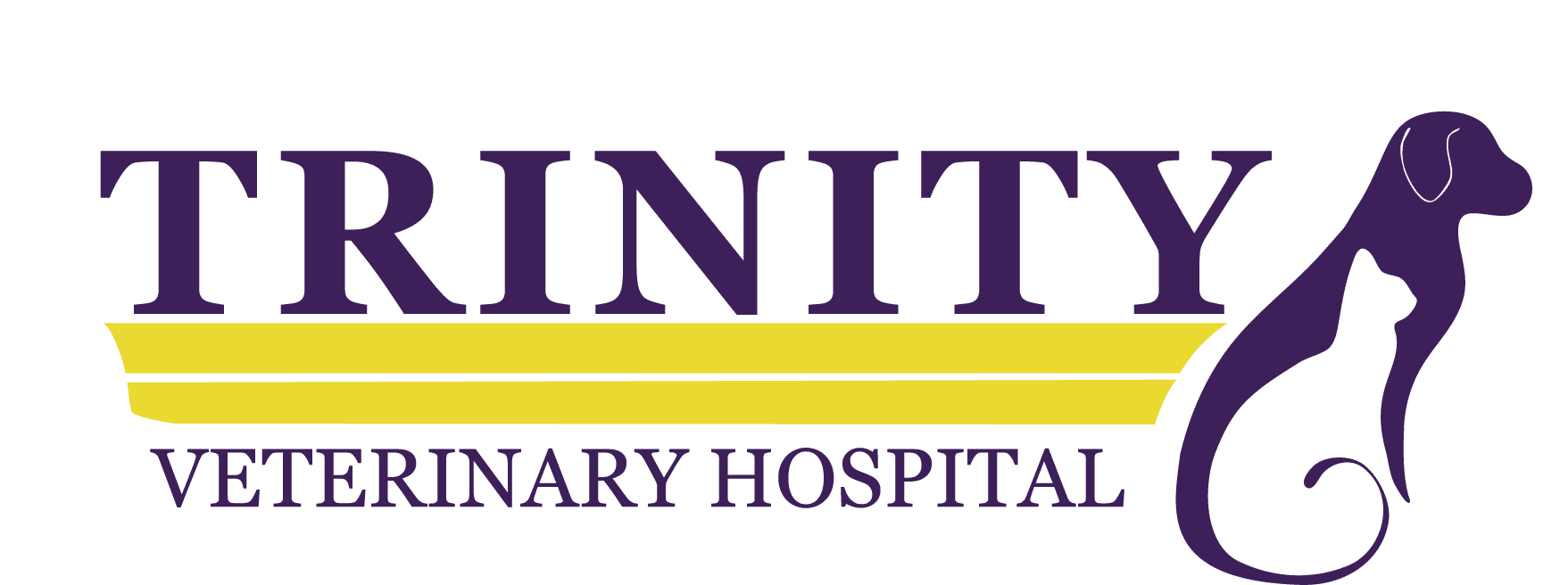Can Cats Eat Scrambled Eggs?

If your cat has ever sniffed around your breakfast and you’ve wondered if you can share your scrambled eggs, the answer is yes. Cats can safely consume plain, cooked scrambled eggs in moderation. Eggs are a high-quality source of protein, essential amino acids, and vitamins, which can be a nutritious occasional treat for your feline companion. However, it’s important that scrambled eggs are fully cooked and served plain, without added ingredients like salt, butter, cheese, or milk that can upset a cat’s digestive system or lead to obesity over time. While eggs are not a replacement for a balanced cat diet, they can supplement your cat’s nutrition and provide a safe, protein-rich treat. At Trinity Veterinary Hospital in Stillwater, OK, we recommend any dietary additions or treats be discussed with your veterinarian to ensure they align with your cat’s individual health needs.
Are Eggs Good for Cats
Eggs are a nutrient-dense food that can offer several benefits to cats when given safely and in moderation. They are rich in high-quality protein, essential fatty acids, and vitamins such as B12, riboflavin, and selenium, which support muscle development, energy, and overall health. Protein is especially important for cats, as they are obligate carnivores and require amino acids like taurine that are naturally found in animal proteins. Eggs can also be a helpful supplement for cats who are underweight or recovering from illness, providing extra nutrients in a highly digestible form. Despite these benefits, eggs should never replace a complete and balanced feline diet formulated to meet all of your cat’s nutritional needs.
Key Nutritional Benefits
- High-quality protein: supports muscle maintenance and energy
- Essential fatty acids: contribute to healthy skin and coat
- Vitamins and minerals: aid in metabolism, nervous system function, and immunity
- Digestible treat: easy for most cats to eat and enjoy
Always introduce eggs gradually and monitor your cat for any digestive upset. For personalized guidance, call Trinity Veterinary Hospital at (405) 533-0001 to discuss whether eggs are appropriate for your cat.
Can Cats Eat Scrambled Eggs with Milk
Many pet owners wonder if adding milk to scrambled eggs makes them safer or more nutritious for cats. While milk is often associated with cats, the reality is that most adult cats are lactose intolerant. Consuming milk or milk-containing scrambled eggs can lead to gastrointestinal upset, including diarrhea, vomiting, and gas. Cats do not require milk in their diet for calcium or hydration, as these needs are met through a complete cat food diet. Therefore, scrambled eggs made with milk are generally not recommended. Feeding plain, fully cooked scrambled eggs without milk ensures your cat benefits from the protein and nutrients without risking digestive issues.

Considerations for Milk in Eggs
- Most adult cats are lactose intolerant
- Milk can cause diarrhea, vomiting, and stomach discomfort
- Nutritionally unnecessary if feeding a balanced diet
- Plain scrambled eggs are safer and easier to digest
If you’re unsure whether milk or other ingredients are safe for your cat, contact Trinity Veterinary Hospital at (405) 533-0001 for guidance tailored to your cat’s health.
Can Cats Eat Scrambled Eggs with Cheese
Cheese is another ingredient often added to scrambled eggs that may not be ideal for cats. Like milk, cheese contains lactose, which can be difficult for adult cats to digest. Additionally, cheese is high in fat and sodium, which can contribute to obesity, pancreatitis, or other health concerns if fed regularly. Small amounts of certain low-lactose cheeses may be tolerated by some cats, but it is best to avoid adding cheese to scrambled eggs as a routine treat. Feeding plain scrambled eggs without cheese ensures your cat receives protein and essential nutrients without unnecessary additives that could affect their health.
Risks of Cheese for Cats
- Lactose intolerance: can lead to digestive upset
- High fat and sodium: may contribute to obesity or pancreatitis
- Unnecessary calories: not required for a balanced feline diet
- Safe alternatives: plain, fully cooked eggs without additives
For questions about safe treats or ingredient modifications, Trinity Veterinary Hospital can provide professional advice at (405) 533-0001.
Can Cats Eat Scrambled Eggs with Butter
Butter is another common addition to scrambled eggs, but it is not recommended for cats. Butter is almost entirely fat and provides no essential nutrients for cats, while high fat content can lead to digestive upset, obesity, or pancreatitis if consumed regularly. Feeding scrambled eggs with butter can also mask the flavor and texture of the eggs, potentially making it harder for you to gauge your cat’s tolerance. Plain, cooked eggs are sufficient to provide protein and nutrients without the unnecessary risk associated with butter or other cooking fats.

Why Butter is Unsafe
- High fat content: can trigger digestive issues
- Calorie dense: increases risk of obesity
Feeding Eggs Safely to Your Cat
When offering eggs to your cat, moderation and preparation are key. Always ensure the eggs are fully cooked to eliminate the risk of bacterial contamination, such as Salmonella, which can affect both pets and humans. Avoid adding salt, spices, oils, butter, milk, or cheese. Serve eggs in small portions appropriate to your cat’s size, and observe your cat for any digestive issues after the first serving. Eggs can be used as an occasional treat or supplement, particularly for cats needing extra protein, but they should never replace a nutritionally complete diet formulated for feline needs.
Tips for Safe Egg Feeding
- Fully cook eggs: no runny yolks or raw whites
- Avoid additives: salt, butter, cheese, or milk
- Small portions: serve as an occasional treat
- Monitor for reactions: watch for vomiting or diarrhea
For personalized advice, call Trinity Veterinary Hospital in Stillwater, OK at (405) 533-0001 to discuss introducing eggs or other treats into your cat’s diet safely.
Making Eggs a Healthy Cat Treat
In summary, cats can eat scrambled eggs safely when they are plain and fully cooked. Eggs provide high-quality protein, essential amino acids, and vitamins, making them a nutritious occasional treat. However, adding milk, cheese, butter, or other ingredients can introduce digestive issues, excess calories, or unnecessary fat. Observing your cat after feeding eggs and consulting a veterinarian ensures safe introduction and prevents health complications. At Trinity Veterinary Hospital, we encourage pet owners to seek professional guidance when adding any new food to their cat’s diet. Call us at (405) 533-0001 to discuss whether scrambled eggs or other treats are appropriate for your feline friend. With careful attention, eggs can be a safe, healthy, and enjoyable addition to your cat’s treat rotation.
Recent Posts
About Us
For over a decade, Trinity Veterinary Hospital has provided compassionate, faith-based care to pets in our college town and beyond. We treat every pet like family, offering routine checkups, boarding, and advanced care from a board-certified internist.
